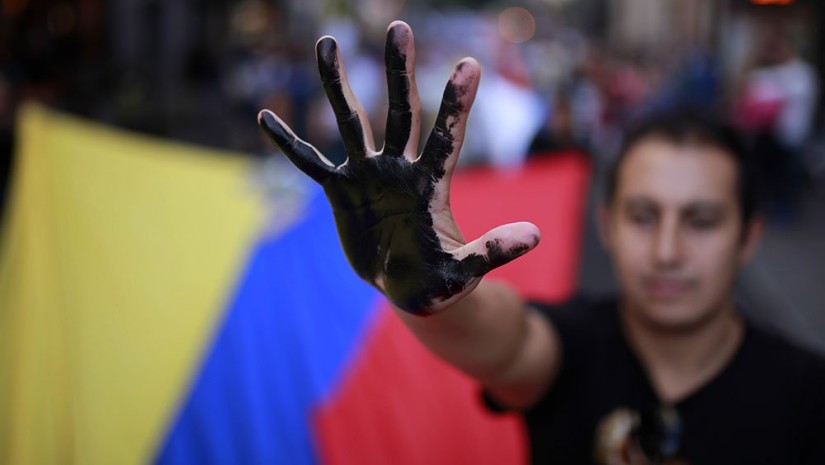
Investor's Business Daily 31/05/2017

A protester shows his black-painted hand as he carries an Ecuador flag to protest against Chevron and the oil contamination in Ecuador's Amazon region during a demonstration in Madrid, Spain, in 2013. Ecuador was awarded a $19 billion judgment for damages in 2013, but that was subsequently overturned due to illegal activity by the plaintiffs' U.S.-based attorney. Photo: Investor's Business Daily
The mass torts litigation saga of Chevron v. Donziger continues.
In this long-running case, the U.S. District Court in Manhattan ruled and the U.S. Court of Appeals for the 2nd Circuit affirmed that, among other things, Chevron (CVX) properly used the civil RICO (Racketeer Influenced and Corrupt Organizations Act) laws to hold liable plaintiffs' attorney Steven R. Donziger for engaging in fraud, obstruction of justice, and other illegal acts.
Donziger petitioned the U.S. Supreme Court to hear his appeal, known as a "cert. (short for certiorari) petition." One of the questions he asked the court to hear was whether RICO authorized federal courts to issue injunctive relief to private parties. Donziger claims that the answer is no.
Donziger is a New York plaintiffs' attorney who in 2003, along with the activist group Amazon Defense Front, sued Chevron. The case originates from a 1960's oil production agreement between Texaco Inc. and the Ecuadorian government, which Donziger claimed polluted the Amazon in northeastern Ecuador's Sucumbios province and made the residents sick.
Chevron acquired Texaco in 2001 and inherited its alleged torts. Donziger won a $19 billion verdict against Chevron in the Ecuadorian trial court, which the Ecuadorian high court later reduced to $8.65 billion. Donziger sought to enforce his Ecuadorian judgment in Canada, Argentina and Brazil because Chevron has no assets in Ecuador.
Chevron discovered that Donziger committed several illegal acts, including paying bribes and ghost-writing judicial opinions. Chevron thus used RICO to sue Donziger in the federal trial court based in Manhattan.
There, Chevron proved at trial that Donziger used an existing "enterprise" to order, commit and/or conspire to commit multiple illegal acts such as, for example, mail and wire fraud, bribery, blackmail, extortion and money laundering (known as "predicate offenses") in order to secure his Ecuadorian verdict. Chevron sought only to enjoin Donziger from profiting from the fraud and other predicate offenses committed in obtaining the Ecuadorian judgment, not worldwide enforcement of it.
Both the trial and appellate courts ruled that a party may not enforce nor benefit from a judgment in the U.S. that its attorneys obtained through fraudulent or illegal means, even if the party was unaware of the illegality. The trial judge found Donziger liable under RICO and prohibited all the co-defendants from profiting in the U.S. from the ill-gotten Ecuadorian judgment. The 2nd Circuit affirmed in full.
Donziger's cert. petition is particularly interesting because its factual summary attempts to paint Donziger as a saintly hero and put Chevron in the classic "evil corporation" role.
For example, it complains that Chevron has not paid any of the $8.65 billion in damages from the Ecuadorian court's verdict. Donziger's petition, however, does not discuss the truth: The Ecuadorian verdict is fraudulent because Donziger committed deceitful and illegal acts in order to obtain it, and thus Chevron was not going to pay a dime on that verdict.
Moreover, any of Donziger's attempts to challenge, recast, or re-litigate the facts in his petition are inappropriate and useless at this stage; the Supreme Court generally accepts a district court's factual findings, especially in cases such as this one, where the appellate court affirmed all of those findings.
Read more here.
Fuente OriginalNotas relacionadas